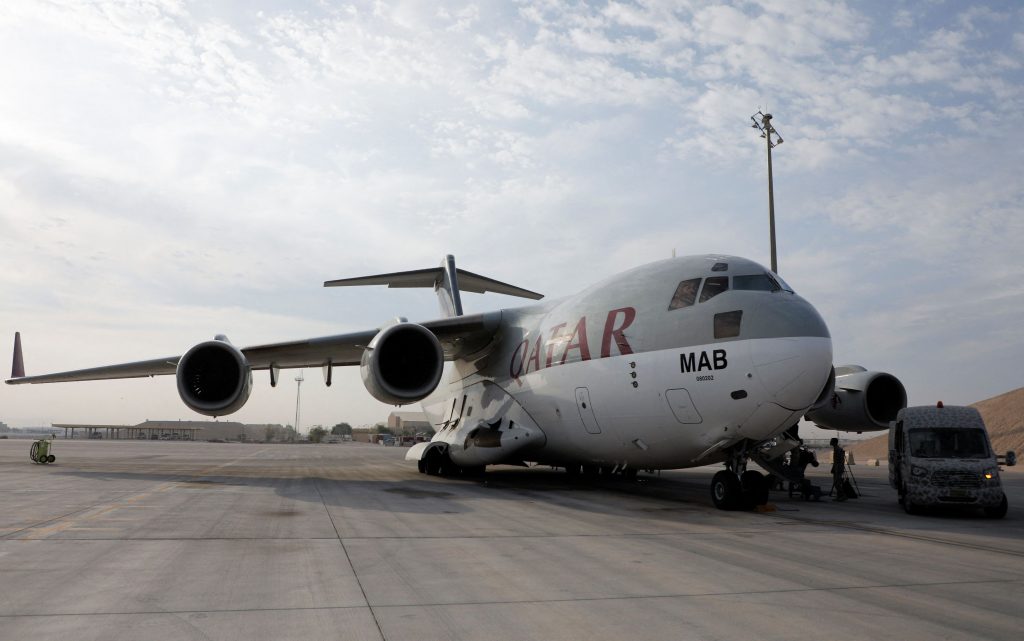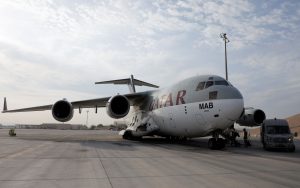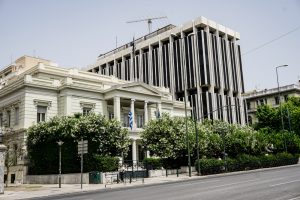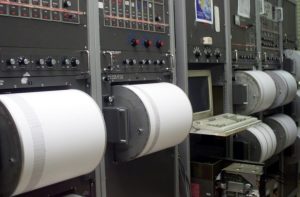DAMASCUS, Syria—More than a decade of civil war left Syria’s economy in shambles . The country lost billions of dollars in oil exports. Inflation forced Syrians to carry massive wads of cash to pay for basic necessities, and nearly one-third of the country was estimated to suffer from extreme poverty.
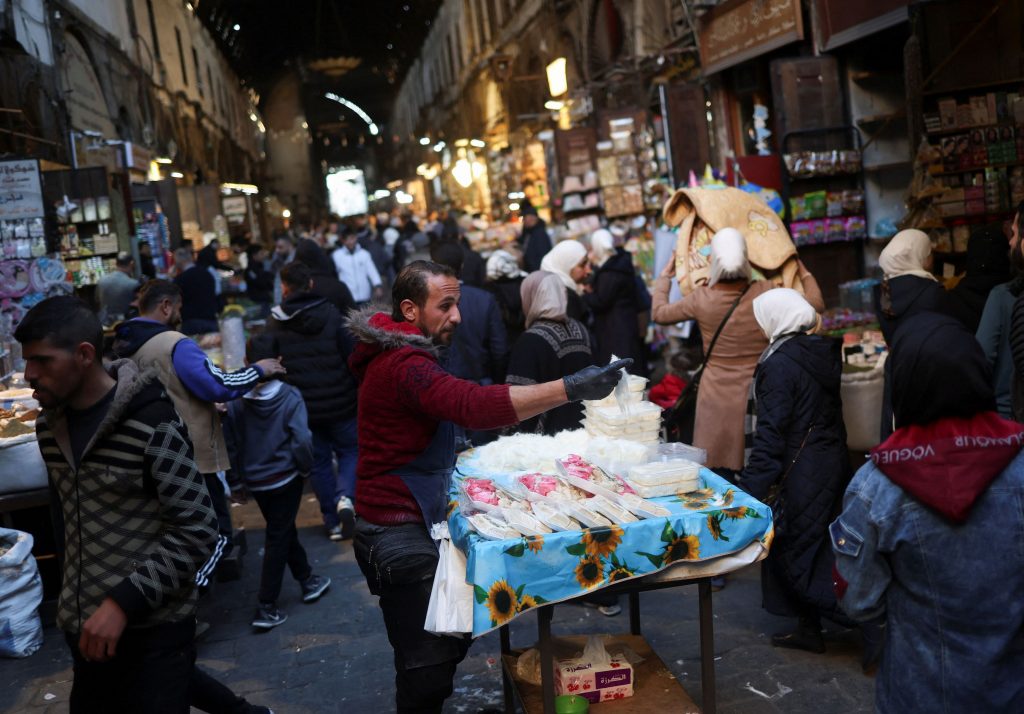
A Syrian street vendor shows traditional sweets to customers in a popular market known as the Hamidiya souk at the Old City of Damascus, after the ousting of Syria’s Bashar al-Assad, in Damascus, Syria, December 25, 2024. REUTERS/Amr Abdallah Dalsh
Now, as Syria’s new leaders seek to rebuild , they are confronting a raft of challenges, including convincing Western powers to lift sanctions and regaining control of the country’s oil sector. They will need help from foreign businesses and states, and some of the millions of Syrians who fled the country during the civil war.
“We need the know-how for doing business, we need the technology, we need plenty of things,” said Mohammad Hallak, owner of a generations-old food-trading company and vice president of the Damascus Chamber of Commerce. “We especially need sanctions to be raised in order to make the banking system work properly and to move forward.”
On the streets of Damascus, the downfall of the Assad regime has brought a newfound sense of optimism about the country’s future. Prices are dropping, and people are conducting transactions in foreign currencies for the first time in years. Hotel lobbies in Damascus are teeming with Turkish businessmen looking to cut deals with Syrians.
The country’s new rulers, the Islamist group Hayat Tahrir al-Sham , say they want to build a free-market economy, revitalize the oil industry and forge international partnerships. But none of that will be easy, with the country still fractured, foreign powers vying for influence and the West wary of a group running the country that began as an offshoot of al Qaeda.
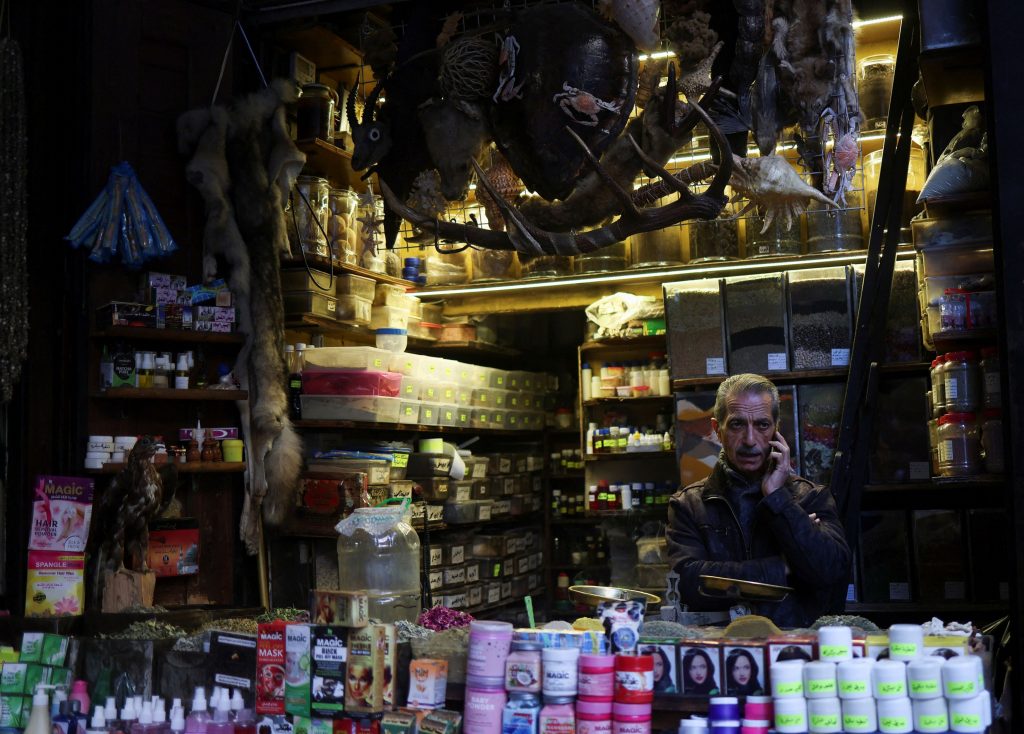
A Syrian vendor waits for customers in his shop at a popular market known as the Hamidiya souk at the Old City of Damascus, after the ousting of Syria’s Bashar al-Assad, in Damascus, Syria, December 25, 2024. REUTERS/Amr Abdallah Dalsh
HTS publicly cut ties with al Qaeda years ago and has sought to cast itself as a more moderate Islamist group. But the U.S., European Union and United Nations still designate it as a terrorist organization. They have kept restrictive sanctions in place, giving them leverage while they watch to see how the new government manages the country’s diverse populations and handles issues such as women’s rights.
For Ankara, which has ties to HTS, a role in Syria’s rebuilding would boost its own construction industry and counter Kurdish forces that control swaths of territory along the Turkish border.
“Turkey has emerged as the net winner and main power in Syria, though there is likely to be intense pushback against this by Saudi Arabia and U.A.E.,” said Omar Dahi, professor of economics at Hampshire College in Massachusetts. “Turkish industry and infrastructure are best placed to take advantage of reconstruction.”
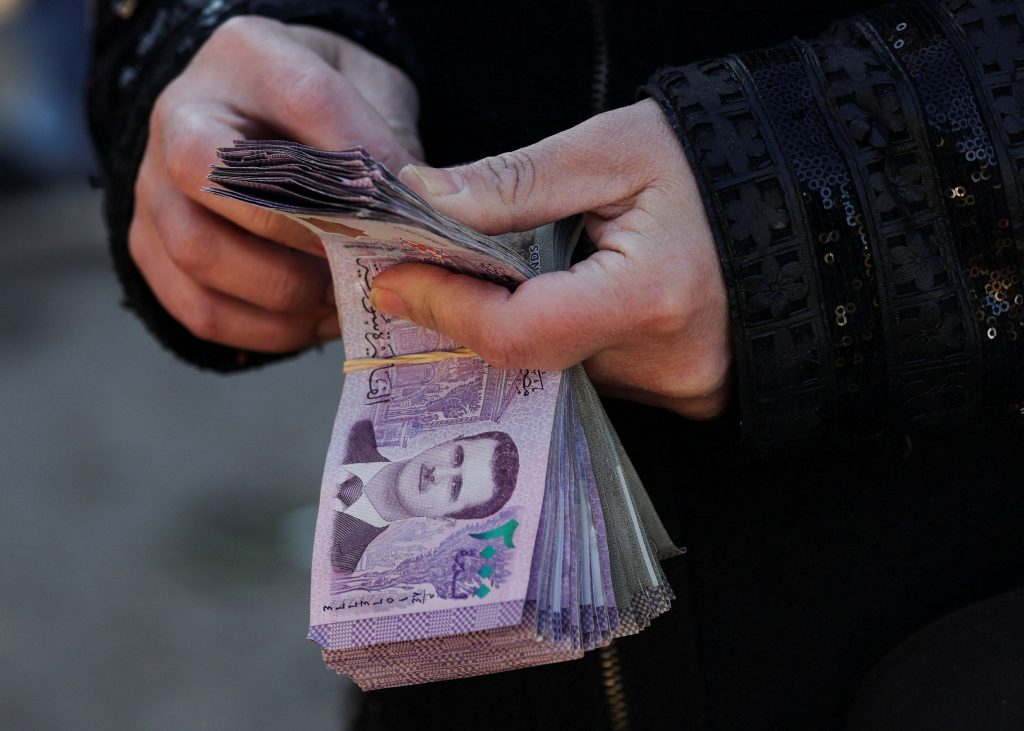
A woman counts Syrian currency bills at a market, after the ousting of Syria’s Bashar al-Assad, in Damascus, Syria, December 16, 2024. REUTERS/Amr Abdallah Dalsh
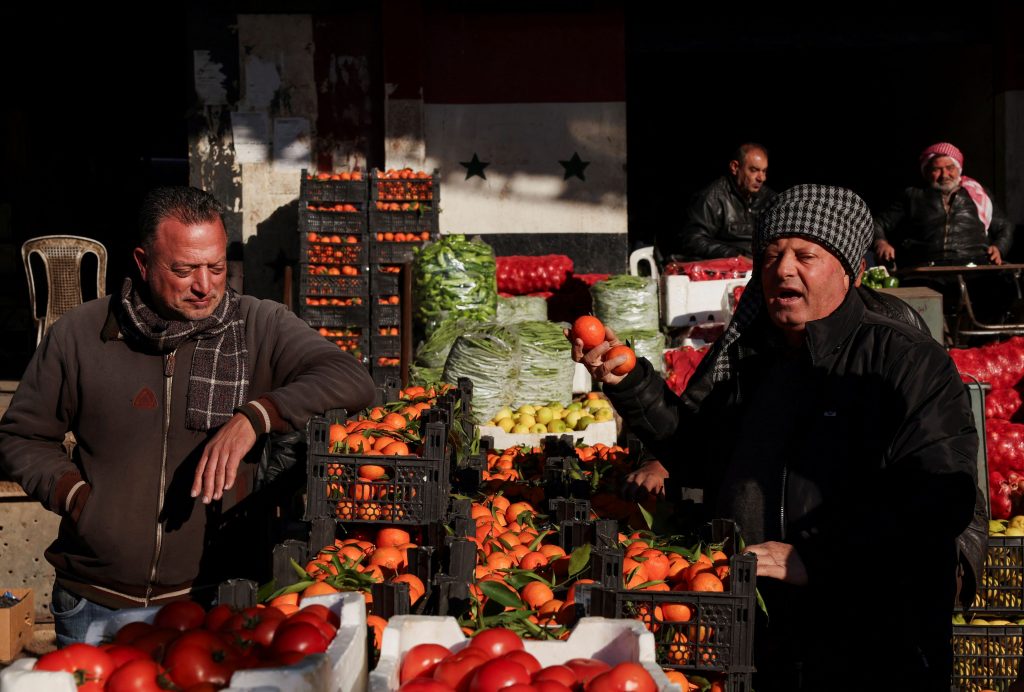
People sell produce at a market, after the ousting of Syria’s Bashar al-Assad, in Damascus, Syria, December 16, 2024. REUTERS/Amr Abdallah Dalsh
The former rebels trying to manage these challenges for a country of more than 20 million people are understaffed and short on experience, having governed only a single province before finding themselves in charge. New government officials from HTS are sharing offices with some low and midlevel staffers from the Assad era, as they learn how to handle large-scale bureaucracy.
Before the civil war, which began in 2011, Syria was a fast-growing, lower-middle-income country with virtually no extreme poverty, according to the World Bank.
Poverty has since crippled much of the country. Roughly 75% of the population is estimated to be living on less than $3.65 per person a day, according to the World Bank, and 33% on less than $2.15, which is considered extreme poverty.
Fuel shortages, which have led to frequent blackouts, are a major challenge. Syria was once a net oil exporter—earning $3 billion to $5 billion a year, nearly half its export revenue—via sales mainly to Europe. That came apart after 2011, when the Assad regime began a bloody campaign to stay in power following protests against its rule. Sanctions cut into sales, and the regime lost control of many oil fields during the civil war.
Iran, a close partner of the Assad regime, helped fill the gap but halted oil shipments after the rebels took over. Along the border crossing between Syria and Lebanon, dozens of people could be seen smuggling in canisters of gasoline.
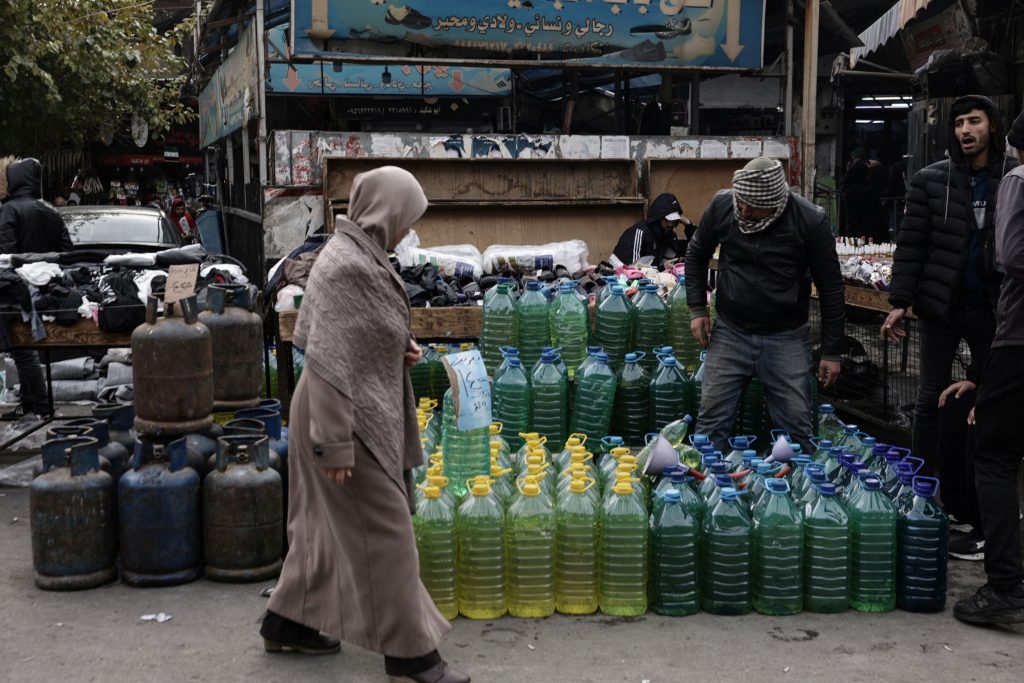
A woman walks past containers filled with fuel, sold on the black market, after Syria’s Bashar al-Assad was ousted, in Damascus, Syria, December 28, 2024. REUTERS/Zohra Bensemra
Meanwhile, HTS doesn’t control Syria’s northeast, home to the bulk of the country’s oil reserves, which is held by the Kurdish-led Syrian Democratic Forces.
“If we gain control of the country’s oil fields, we can gain a level of energy independence, rather than being nearly completely reliant on fuel imports as we are now,” said Tareq Asfour, who oversees fuel storage and transport for the state-owned company that manages fuel distribution, now under HTS control.
“There is also much work to do to repair the damage done to our long-neglected oil and gas infrastructure,” Asfour said in an interview, as armed men in fatigues shuffled in and out of his office.
HTS leader Ahmad al-Sharaa said talks with Kurdish-led groups controlling the oil fields are under way. Syria’s interim oil minister didn’t respond to requests for comment.
The civil war and years of international isolation also brought punishing inflation. In the years before the war, roughly 50 Syrian pounds could buy $1. In late December, it cost 13,000 Syrian pounds. Many businesses use electronic machines to count the thick stacks of cash consumers use to pay for anything from a meal to clothing.
Foreign currency, which was restricted by the Assad regime, is finally circulating but it is in short supply. “The central bank needs reserves—its foreign reserves are very low right now—not only to pay government salaries and prop up the currency but also to help fund reconstruction,” said Randa Slim, a senior fellow at the Middle East Institute, a think tank in Washington.
Foreign currencies are now preferred by some businesses. Freelance currency exchangers roam the streets and get stopped by people asking to take selfies with previously rare U.S. bills.
Hallak, the Damascus business leader, said previously any foreign-currency exchanges, when dealing with international businesses or individuals, had to be conducted through state-controlled entities, which charged fees of around 10%.
“It really drove up costs. Even people abroad who were sending money to try to help their families in Syria had to pay this,” he said. “Now that we can freely transact in dollars, we are in a better position.”
There are signs of improvement. Several owners of Syrian businesses of various sizes said in interviews that prices have gone down since the fall of the Assad regime, due in part to the elimination of the regime’s fees and bribes.
Stores that once hid smuggled foreign goods now display them prominently.
“Take your pick,” said Saleh Mustafa, owner of a tobacco shop in Damascus, pointing at a glass shelf stocked with foreign cigarettes. “It is still strange to me that this doesn’t get me in trouble.”
Businesses and consumers say they are cautiously optimistic about the economic future. Reema Sbiehe, a pharmacist in Damascus, said customers are happy to be able to access foreign medicine brands at cheaper prices since the Assad regime fell.
“There was a reputation that Syrian drugs were not as effective or high quality,” she said. “The foreign drugs we would sell were under the table and more expensive. Now, they are more accessible.”
The U.S. is weighing various forms of temporary sanctions relief to provide needed aid, a person familiar with the matter said. Barbara Leaf, U.S. assistant secretary of state for Near Eastern Affairs, met the new government in Damascus in mid-December. She didn’t comment on lifting sanctions but said the U.S. has latitude to provide some early assistance to the country’s recovery.
The EU has sought assurances from HTS before it lifts sanctions but has also said it would boost humanitarian aid efforts.
Dahi, the economics professor, said the maintenance of sanctions could keep the central government weak and dependent on countries with the ability to finance projects.
“We’re likely to see the emergence of dual or multiple ‘public sectors,’” he said, describing a scenario in which states that finance large projects bypass the central government for some decision-making within Syria.
“Syria’s peace right now is extremely fragile, particularly given the dire economic needs,” said Dahi.
Write to Omar Abdel-Baqui at omar.abdel-baqui@wsj.com
